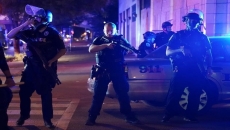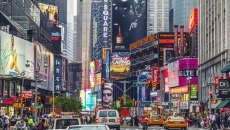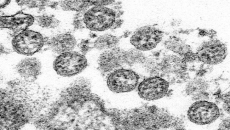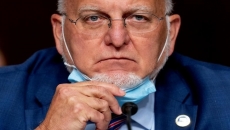LONDON (AP) — WHAT IS THIS NEW COVID-19 VARIANT IN SOUTH AFRICA?
South African scientists identified a new version of the coronavirus this week that they say is behind a recent spike in COVID-19 infections in Gauteng, the country’s most populous province. It's unclear where the new variant actually arose, but it was first detected by scientists in South Africa and has now been seen in travelers to Belgium, Botswana, Hong Kong and Israel.
Health Minister Joe Phaahla said the variant was linked to an “exponential rise” of cases in the last few days, although experts are still trying to determine if the new variant, named B.1.1.529, is actually responsible.
From just over 200 new confirmed cases per day in recent weeks, South Africa saw the number of new daily cases rocket to 2,465 on Thursday. Struggling to explain the sudden rise in cases, scientists studied virus samples from the outbreak and discovered the new variant.
On Friday, the World Health Organization was convening a group of experts to assess the data from South Africa.
WHY ARE SCIENTISTS WORRIED ABOUT THIS NEW VARIANT?
It appears to have a high number of mutations — about 30 — in the coronavirus’ spike protein, which could affect how easily it spreads to people.
Sharon Peacock, who has led genetic sequencing of COVID-19 in Britain at the University of Cambridge, said the data so far suggest the new variant has mutations “consistent with enhanced transmissibility,” but said that “the significance of many of the mutations is still not known.”
Lawrence Young, a virologist at the University of Warwick, described the variant as “the most heavily mutated version of the virus we have seen.” He said it was concerning that although the variant was only being detected in low levels in parts of South Africa, “it looks like it's spreading rapidly.”
Dr. Anthony Fauci, the U.S.' top infectious diseases doctor, said American officials had arranged a call with their South African counterparts later on Friday to find out more details and said there was no indication the variant had yet arrived in the U.S.
WHAT'S KNOWN AND NOT KNOWN ABOUT THE VARIANT?
Scientists know that the new variant is genetically distinct from previous variants including the beta and delta variants, but do not know if these genetic changes make it any more transmissible or dangerous. So far, there is no indication the variant causes more severe disease.
It will likely take weeks to sort out if the new variant is more infectious and if vaccines are still effective against it.
Even though some of the genetic changes in the new variant appear worrying, it's still unclear if they will pose a public health threat. Some previous variants, like the beta variant, initially alarmed scientists but didn't end up spreading very far.
“We don’t know if this new variant could get a toehold in regions where delta is,” said Peacock of the University of Cambridge. “The jury is out on how well this variant will do where there are other variants circulating.” To date, delta is by far the most predominant form of COVID-19, accounting for more than 99% of sequences submitted to the world’s biggest public database.
HOW DID THIS NEW VARIANT ARISE?
The coronavirus mutates as it spreads and many new variants, including those with worrying genetic changes, often just die out. Scientists monitor COVID-19 sequences for mutations that could make the disease more transmissible or deadly, but they cannot determine that simply by looking at the virus.
Peacock said the variant “may have evolved in someone who was infected but could then not clear the virus, giving the virus the chance to genetically evolve," in a scenario similar to how experts think the alpha variant — which was first identified in England — also emerged, by mutating in an immune-compromised person.
ARE THE TRAVEL RESTRICTIONS BEING IMPOSED BY SOME COUNTRIES JUSTIFIED?
Maybe. As of noon Friday, travelers arriving in the U.K. from South Africa, Namibia, Botswana, Lesotho, Eswatini and Zimbabwe will have to self-isolate for 10 days. European Union nations also moved quickly on Friday to try to stop air travel from southern Africa.
Given the recent rapid rise in COVID-19 in South Africa, restricting travel from the region is “prudent” and would buy authorities more time, said Neil Ferguson, an infectious diseases expert at Imperial College London.
Jeffrey Barrett, director of COVID-19 Genetics at the Wellcome Sanger Institute, thought that the early detection of the new variant could mean restrictions taken now would have a bigger impact than when the delta variant first emerged
“With delta, it took many, many weeks into India’s terrible wave before it became clear what was going on and delta had already seeded itself in many places in the world and it was too late to do anything about it,” he said. “We may be at an earlier point with this new variant so there may still be time to do something about it.”
WHAT HAPPENS NEXT?
The World Health Organization has convened a technical group of experts to decide whether the new variant warrants being designated a variant of interest or a variant of concern. If they do, the variant will likely be named after a letter of the Greek alphabet, in line with the current naming system.
Variants of interest — which currently include the mu and lambda variants — have genetic changes known to affect things like transmissibility and disease severity and have been identified to cause significant clusters in multiple countries.
Variants of concern — which include alpha, beta and delta — have shown they can spread more easily, cause more serious disease or make current tools like vaccines less effective.






